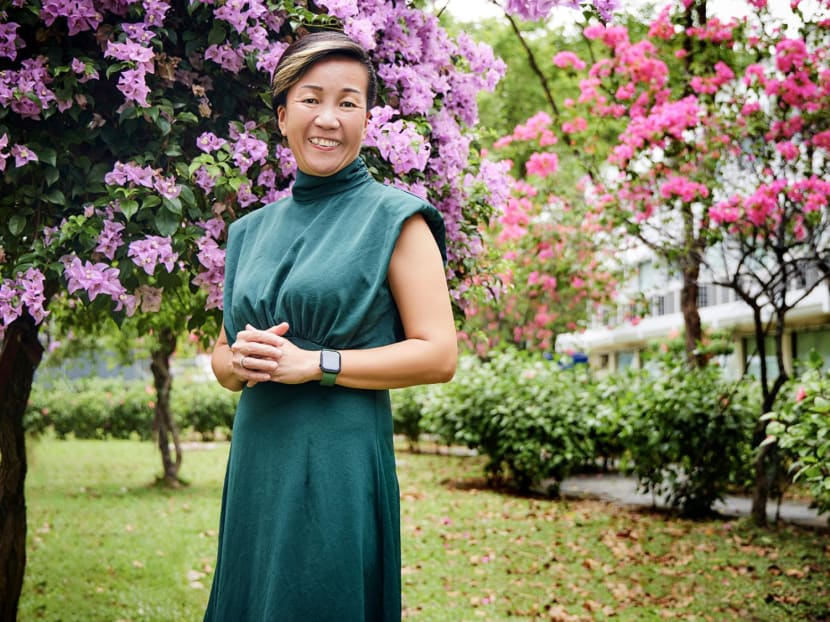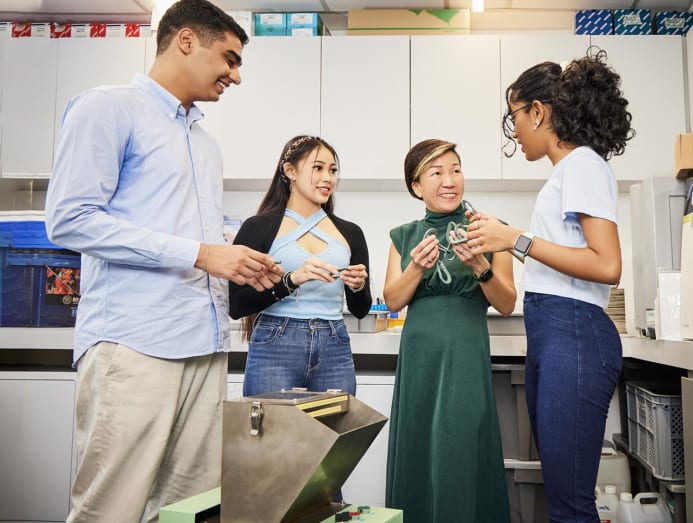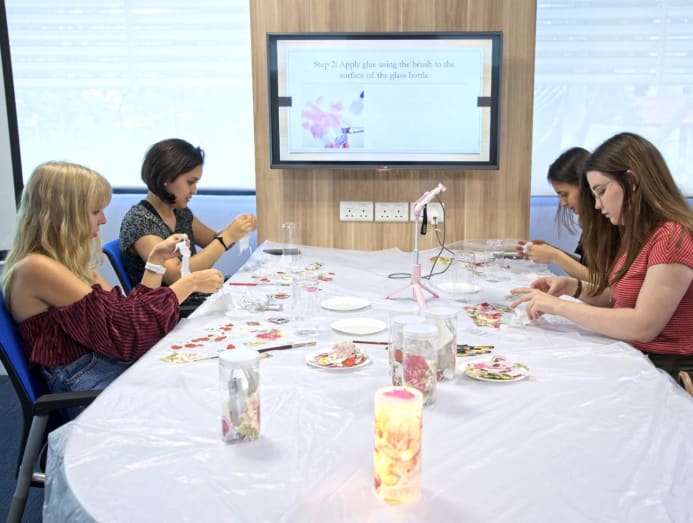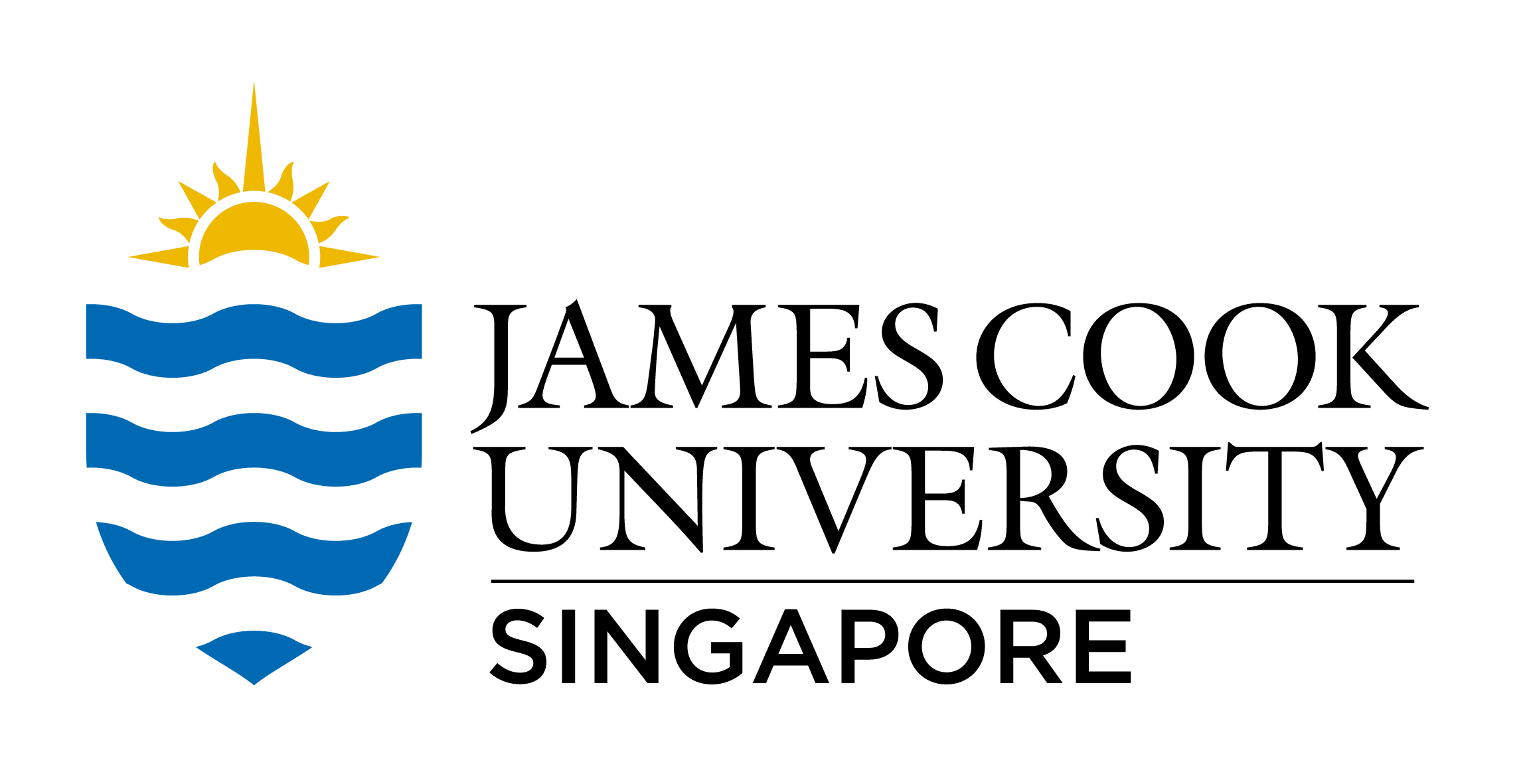Cultivating agents of change for a more sustainable world

By educating students and staff about sustainability, universities can cultivate change agents, says Prof May Tan-Mullins, JCU’s dean international and chief sustainability officer. Photo: Mediacorp Studio 3
Through its innovative degree programmes and campus-wide initiatives, James Cook University is doing its part to drive sustainable practices in Singapore.
For many students, a typical souvenir from one’s university would be a T-shirt, a decorative wall pennant or perhaps a school-branded notebook.
At the Singapore campus of James Cook University (JCU), keepsakes take on a more profound significance, intertwining eco-consciousness with a sense of purpose. Bolstered by seed funding earmarked for sustainability, the university recently acquired a plastic recycling machine, transforming plastic waste into meaningful souvenirs for its students, said Professor May Tan-Mullins, JCU’s dean international and chief sustainability officer.
This is only one aspect of JCU’s dedication to sustainability, which extends beyond its campus borders and takes shape in diverse efforts. They include on-site innovations like installing energy-efficient photocell-controlled lighting and using an eco-shredder to recycle branches and leaves into compost, as well as broader collaborative pursuits, such as partnering with Singapore National Employers Federation to instil sustainability-focused training.
A pivotal testament to JCU’s commitment is the introduction of the Bachelor of Business and Environmental Science programme at its Singapore campus. The degree programme seeks to equip graduates with the essential skills to shape effective environmental strategies for businesses and guide them into a more sustainable future.

LEADING THE CHARGE IN SUSTAINABILITY
In line with the 17 Sustainable Development Goals (SDGs) set out by the United Nations, JCU is actively supporting the Ministry of Education’s target of a two-thirds reduction in net carbon emissions from the education sector by 2030, as well as the Singapore Green Plan 2030 agenda on sustainable development.
Prof Tan-Mullins, who also leads JCU Singapore’s Sustainability Working Group, which was established in April last year, said JCU’s commitment stems from the belief that a united societal effort is necessary to address global sustainability concerns and build a more inclusive and resilient future for the world.
“Universities are hotspots for innovation and learning, with the power to extend the impact to surrounding communities and society. By educating students and staff about what they can do for sustainability, we can cultivate change agents and drive progress across various SDGs,” she said.
To realise this vision, JCU leverages its research clusters – such as the Sustainability Research Cluster and the Ethics, Organisations and Society Research Cluster – to spearhead its multifaceted and interdisciplinary approaches in studying sustainability.

UNITING BUSINESS AND ENVIRONMENTAL SCIENCE
This same approach informs the Bachelor of Business and Environmental Science programme, housed within the JCU Singapore Business School – an institution accredited by the Association to Advance Collegiate Schools of Business (AACSB). The AACSB distinction is held by less than 6 per cent of university-level business schools worldwide.
To align the programme with industry needs and prevailing best practices in Singapore, the university collaborated with businesses to identify their requirements within the environmental sector, customising its academic components and learning outcomes accordingly.
According to Prof Tan-Mullins, the programme’s uniqueness lies in its blend of business acumen and environmental expertise. Students undertake both business and environmental science subjects, including electives in areas like aquaculture, coastal and marine management, and field studies in tropical geography. As they gain an understanding of biodiversity and ecology, they will also be trained in economics, accounting and management.
This comprehensive approach empowers graduates to navigate a business landscape where environmental considerations increasingly drive consumer choices, and prepares them for environmental, social and governance roles in both public and private sectors.
“Our faculty possesses extensive understanding of Singapore’s sustainability demands and skilfully integrates these elements into the curriculum,” said Prof Tan-Mullins. “Their diverse expertise and ongoing research enable them to guide students in tackling region-specific environmental challenges.”
For students aspiring to propel Singapore’s sustainability journey, she advises embracing curiosity, fostering interdisciplinary thinking and developing critical thinking skills. “Harness your passion,” she added, “to bring about positive change on the path to creating a more sustainable world.”
Enrol in the AACSB-accredited Bachelor of Business and Environmental Science programme at James Cook University in Singapore, and be a force for positive change in the world.









